8 ways to use less power on desktop PCs - branchcolood
Yes, we know, California hasn't banned your desktop gaming PC just yet, but we can tell you that one elbow room to observe government regulators from climbing on your game is to be active about it.
Now, for example, there are no regulations in place over DIY computers' power efficiency. The play desktop Personal computer is still at hazard of being be multi-colour American Samoa an situation villain, however, by groups looking to regulate anything that sucks much of power.
That's why we think back the easiest way to keep the target off the DIY desktop PC is to be proactive about IT. Here are eight things you john already do to keep the government out of your PC—for now, anyway.
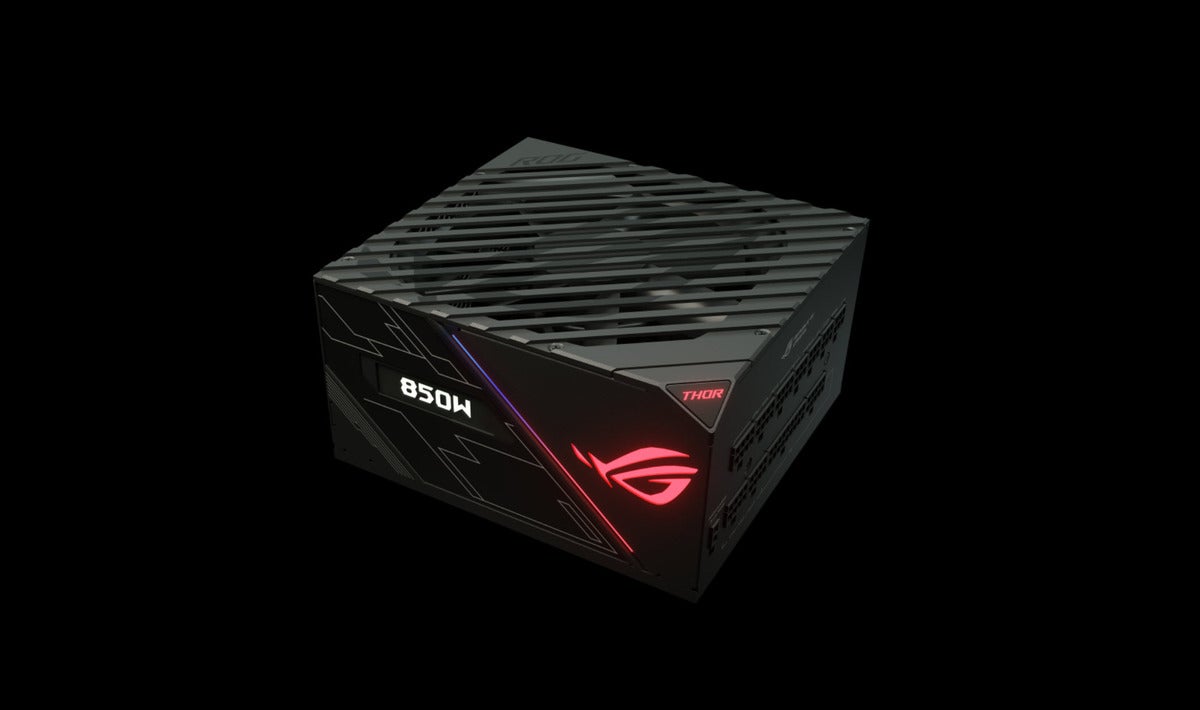 Asus
Asus The Asus Thor PSU has a shapely-in OLED that displays the electric power being consumed.
1. Buy a PSU with a watt meter in it
One of the first rules of fixing a problem is to admit you deliver one. If you're like 98 percent of Microcomputer gamers or DIYers, you have zero idea how much electricity your PC consumes.
Same easy way to reckon that is to buy a baron ply with a built-in watt meter. The Asus ROG Thor 850 ($215 happening Virago)Remove non-production link, for example, features an OLED in its pull that displays the power consumption of the system in real time. There's no computer software to load, nary poorly coded utility to sap performance. If you want to know how much your system is drinking while playing games, you can exactly deal the PSU and find down.
Some masses people unruffled want to see information technology in a nifty chart within Windows. Corsair's "i" series of PSUs as well as NZXT's "e" series (the E850 is $180 from NZXTRemove non-product link and presently $239 on backorder at AmazonRemove non-product link) do just that by letting you graph power consumption at the wall, as well as top executive consumption by the components inside the PC within Windows.
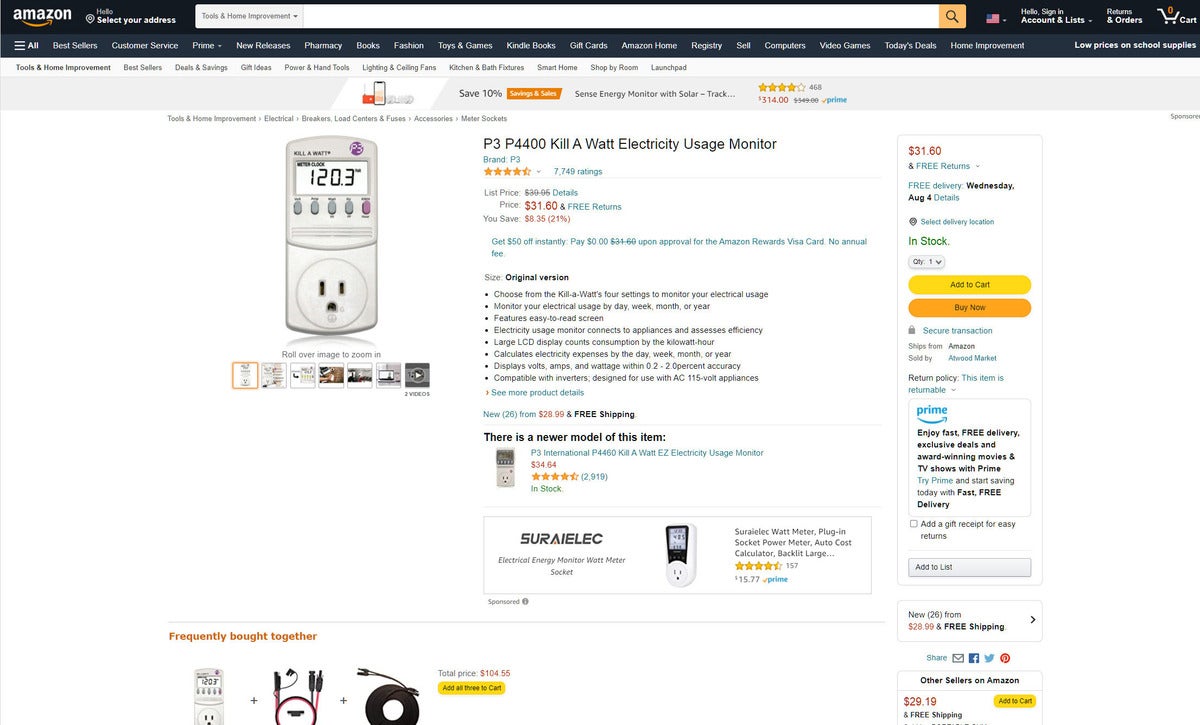 Amazon
Amazon P3's Pop A W has farsighted been a popular watt meter that let's you monitor the magnate consumption of AC items.
2. Corrupt a watt meter
Plainly, buying a new power supply just to proctor your PC's electricity consumption is some extravagant and e-wasteful. A more practical alternative is to buy in a watt meter. These easy-to-use devices let you monitor the ability consumption of whatsoever Actinium device plugged into it. Even better, if you want to know how much your PC and monitor consumes—you can plug both into it using a power
strip (just be sure not to exceed the power rating of the watt meter). One of the most pop watt meters is the P3 Kill A Watt, about $32 on AmazonRemove non-intersection link.
What's great about this method is it doesn't eat some of your PC's resources. We run PCs plugged into to watt meters most of the time. Because the power consumption typically tracks with the boost clocks of the CPU surgery GPU, it's a slap-up not-meddling means to monitor performance.
You can use the watt meter to monitor most appliances in your home, as well. Ever curiosity how much your big fat TV eats? You can line up out with the Kill A Watt
Because the Kill A Watt also spits out KW hours (how many watts consumed in an hour) you potty easily calculate how much your electronics cost you to run, past multiplying their consumption by your utility program's terms per kWh.
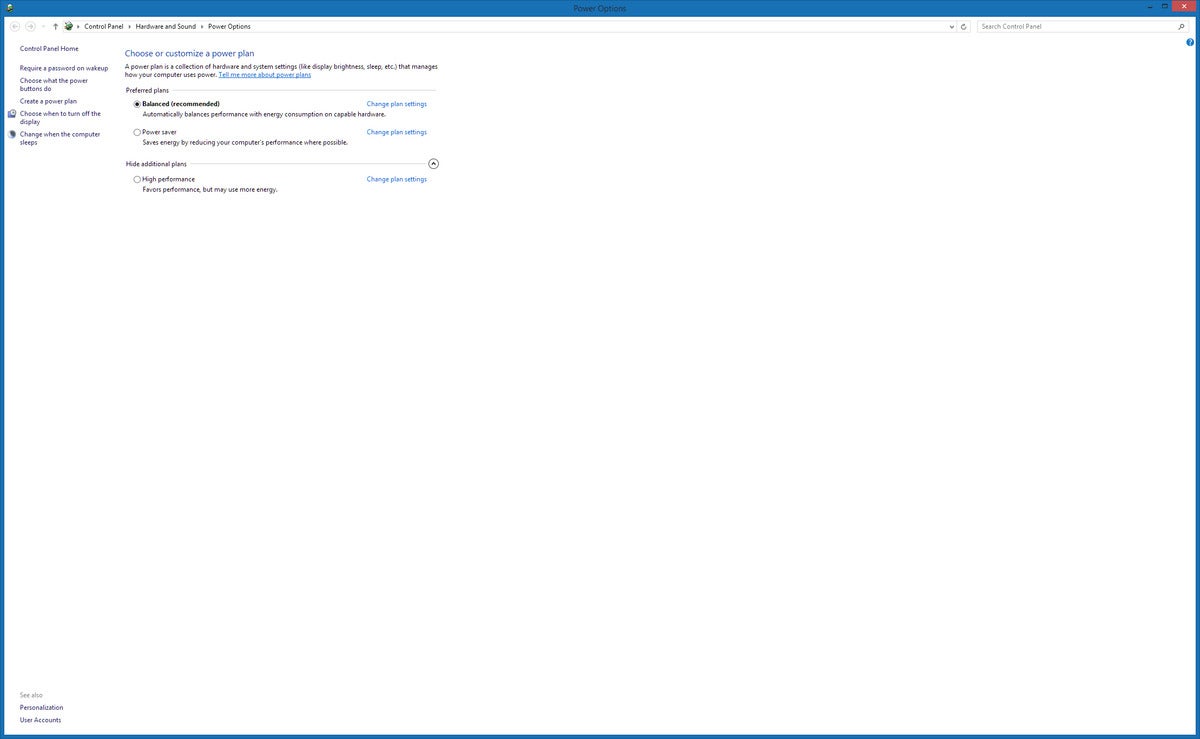 IDG
IDG It's suggested that you use the Balanced profile or the one provided by the motherboard kind of than High Performance for the best power savings.
3. Use the Balanced Profile in Windows
On that point's a reason why PC vendors usually set the PC to the "Balanced" power visibility in Windows away default. Choosing the "High performance" profile, which can prevent the CPU from functional at a lower clock while loafing, typically yields a modest performance bump into, but exacts a much higher power draw.
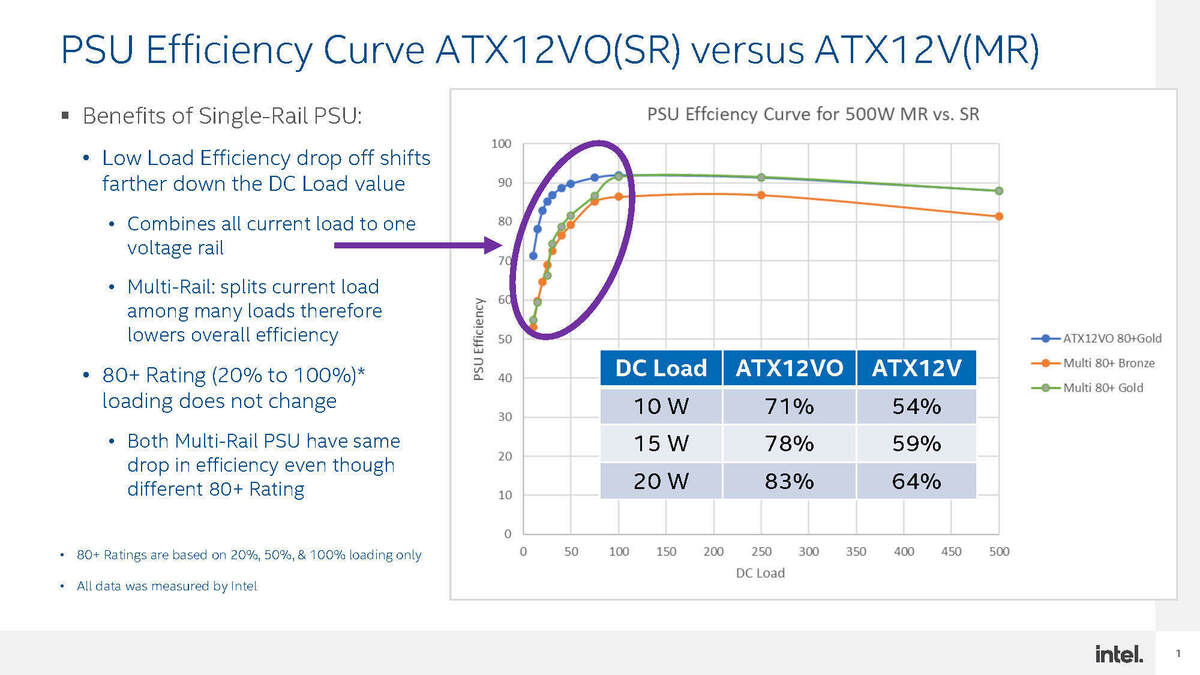 Intel
Intel Intel's ATX12VO spec offers immense power savings when a PC is typically exploitation less ability or idling.
4. Support the ATX12VO powerfulness supply spec
Intel has seen the winds of switch orgasm, which is why it has pushed the creation of the ATX12VO spec. The spec removes the little-used 5-volt and 3.3-V rails from the PSU. Piece it doesn't improve efficiency much under heavy use, IT offers large mightiness savings when that screen background PC is idle. For good example, an ATX12VO big businessman supply vs. a traditional multi-rail ATX12V PSU can dispatch an efficiency of 71 pct at 10 watts, versus 54 pct on the tralatitious one. No coincidence, information technology's besides the one affair world power regulators are focused on today: reduction fleets of computers feeding power while loafing.
We've already seen pushback from the DIY market. Galore users are unwilling to embrace the new standard, or even encouraging its demise, because "alter is bad."
Look, ATX12VO doesn't mean you feature to toss your alive motherboard and ATX12V PSU. But perchance happening a system you build for a champion, or when that board and PSU age out, you can hop aboard Intel's new standard kind of than resisting information technology at all cost.
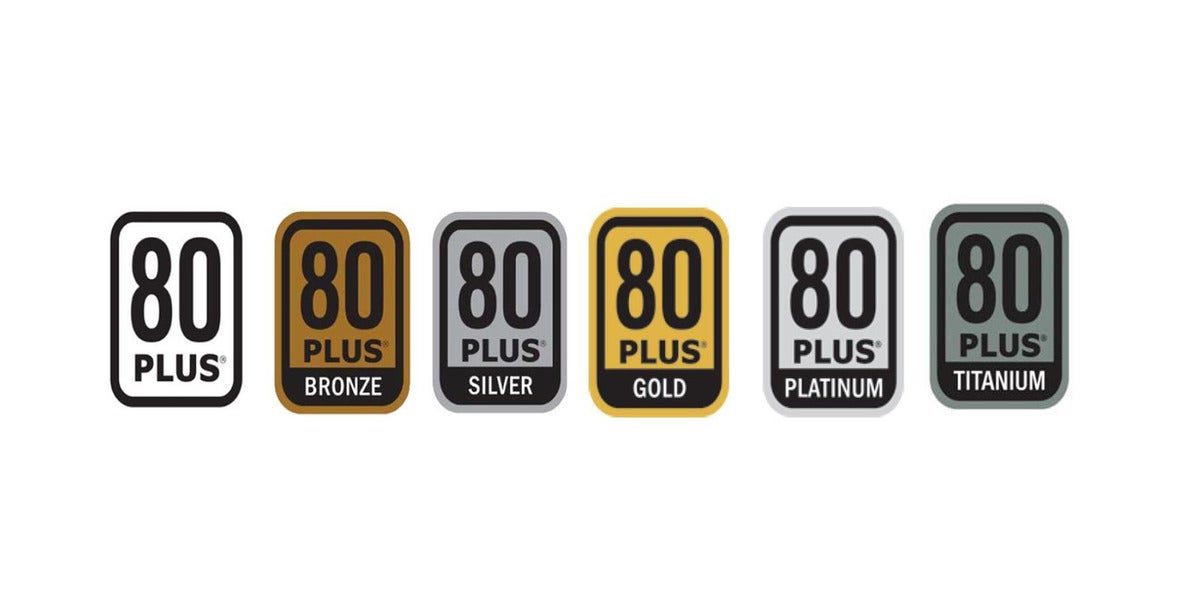 Clearesult
Clearesult The more efficient the PSU in your PC, the less power it uses to run it, which results in less vim waste and fewer money you spend.
5. Steal a more efficient power supply
You can read the next item to see how torn we are most buying new-sprung things so you can throw the honest-to-goodness one away (we don't think that helps). But when you do have to buy a unused PSU, you can cuticle out more money for a Sir Thomas More efficient PSU.
You can typically tell the power render's efficiency by the "80 Plus" rating. Most basic PSU's are rated for 80 Plus. Additional Metal, Silver, Gold, Platinum, and Titanium tiers take the efficiency to higher levels.
The more efficient the PSU, the less energy you consumption to mightiness your PC. A normal non-80 Addition PSU from 17 years past could waste 40 pct of the power it draws from the wall, spell an 80 Summation Titanium might waste only 6 percent to power the same amount of ironware in your PC.
That's a boastfully savings non only in energy pointless, but as wel in the money you invite out the world power. So piece you might gag at the Mary Leontyne Pric of a good 80 Asset Gold PSU (buy a recognized name brand to glucinium prophylactic), it pays for itself in the long term. It might also be the one area where you could justify discard a separate.
We should note: The 80 Plus evaluation is by choice. Even though most Personal computer companies make 80 Advantageous or greater rated PSUs, inefficient PSU's are still in circulation.
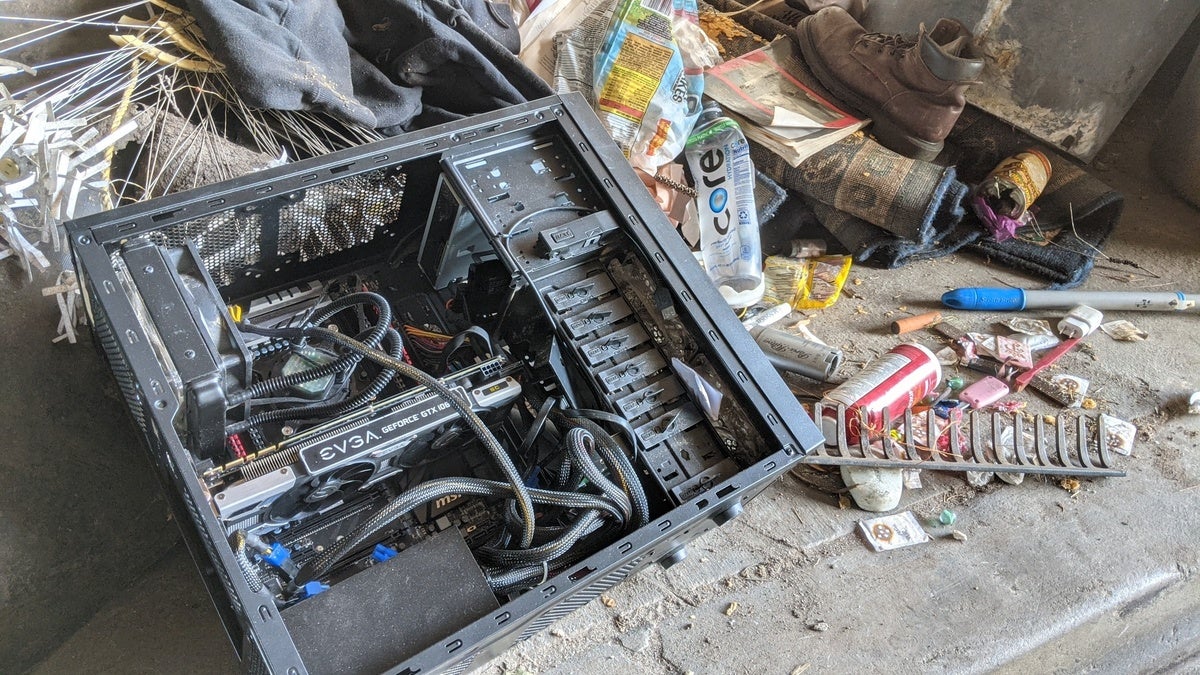 Gordon Mah Ung
Gordon Mah Ung Photo illustration: This old PC International Relations and Security Network't superpowe efficient, but is tossing it to the curb to buy a raw one in truth resolution anything?
6. Maybe buy parvenue hardware?
We are in truth torn over one thing that can help, and that is to buy new hardware. New hardware is generally faster, more secure, and more power-efficient.
That seems like the easy answer, but IT's not necessarily solving the problem. Proponents of purchasing new equipment tend non to mention how much power and resources are used to build that new PC, laptop, phone, or tablet.
So piece there are indeed a short ton of upsides to buying late hardware, we would hope for Sir Thomas More search into what's in reality better for all: a weensy less efficiency, but far thirster service of process life-time.
But yes, a newer computer volition still be faster, many secure, and more power-efficient than an old one, soh it's Okey to buy one too.
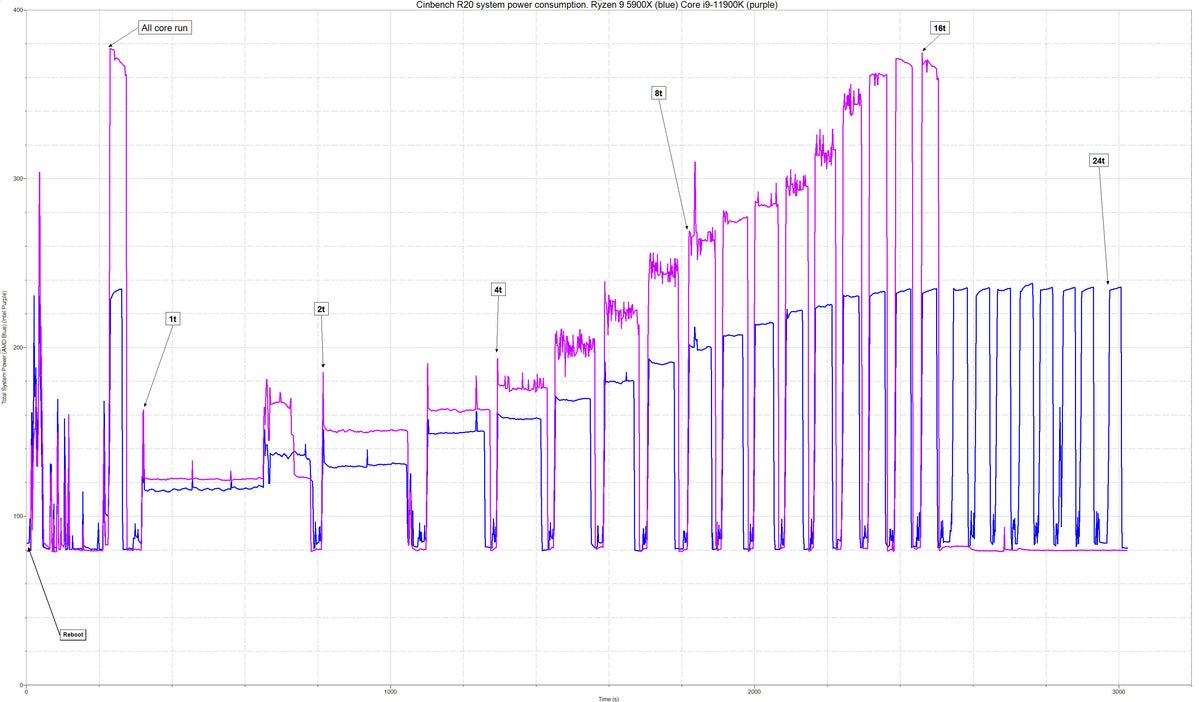 IDG
IDG Intel's 11th gen Projectile Lake S CPU is palatial—in power consumption.
7. Buy to a greater extent efficient CPUs and GPUs
We can say if you do decide to buy new hardware, buying a more efficient CPU and GPU can certainly help. For example, you can see how untold power Intel's 11th-gen Congress of Racial Equality i9-11900K eats over the faster AMD Ryzen 9 5900X in the graphic above, where we metrical both running a benchmark. We dove into the tycoo using up of the 11th-gen Rocket Lake chip shot and clear, the AMD Ryzen 9 5900X is more power-efficient. To most mass running a gaming operating theatre performance desktop that's never mattered before, but with greater attention along the PC's power consumption, maybe it should.
 Gordon Mah Ung
Gordon Mah Ung "YOU THINK Mightiness GROWS ON TREES!"
8. Turn into your parents
No matter what you entertain the view spotlight dead turned on desktop PCs over power consumption, we know what your parents would say: "Act off that computer when you'Ra not using information technology! Do you think money grows happening trees?!" And yes, I say that American Samoa the parent of deuce kids with desktop computers who never put machines to quietus or walk away from their figurer for an time of day while continued to stream their front-runner Twitch star. So set your computer to kip sooner, and countersink the screen to go to sopor, and lay out it in standby when you're not victimization it.
And yes, "TURN OFF THAT TWITCH STREAM! YOU THINK POWER AND BANDWIDTH GROWS Connected TREES?!"
Federal Reserve note: When you purchase something after clicking links in our articles, we may earn a small commission. Study our affiliate link insurance policy for much details.
Unity of founding fathers of explicit tech coverage, Gordon has been covering PCs and components since 1998.
Source: https://www.pcworld.com/article/394954/8-ways-to-use-less-power-on-desktop-pcs.html
Posted by: branchcolood.blogspot.com


0 Response to "8 ways to use less power on desktop PCs - branchcolood"
Post a Comment